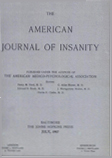THE PSYCHOLOGY OF THE SWINDLER
Abstract
A study of swindlers convicted in the Court of General Sessions, New York, was made to ascertain the psychologic meaning of this offense. We have found that in the swindler himself the offense often means an unconscious gratification of a neurotic conflict. Neurotic conflicts of a psychosexual nature form an important aspect of the swindler's personality.
In addition, there is a psychology of the total situation to be considered in this as in all offenses involving society. In this group of offenses we have described and termed this as the "swindle-situation." Here there are found psychologic mechanisms, perhaps unconscious, common to all men which operate in the victim.
Access content
To read the fulltext, please use one of the options below to sign in or purchase access.- Personal login
- Institutional Login
- Sign in via OpenAthens
- Register for access
-
Please login/register if you wish to pair your device and check access availability.
Not a subscriber?
PsychiatryOnline subscription options offer access to the DSM-5 library, books, journals, CME, and patient resources. This all-in-one virtual library provides psychiatrists and mental health professionals with key resources for diagnosis, treatment, research, and professional development.
Need more help? PsychiatryOnline Customer Service may be reached by emailing [email protected] or by calling 800-368-5777 (in the U.S.) or 703-907-7322 (outside the U.S.).



